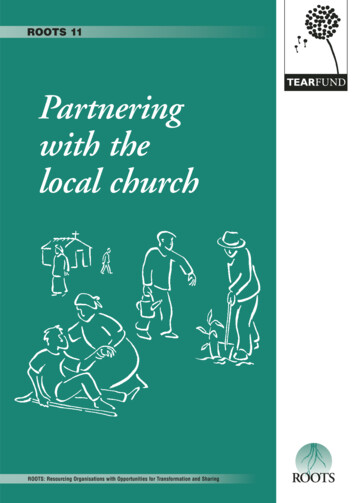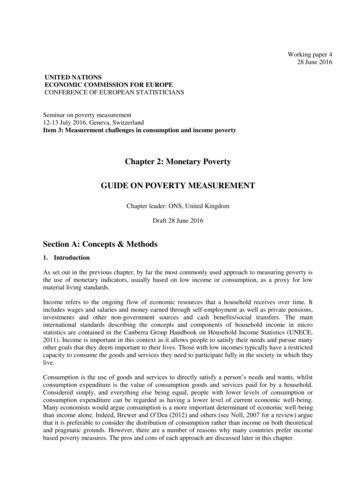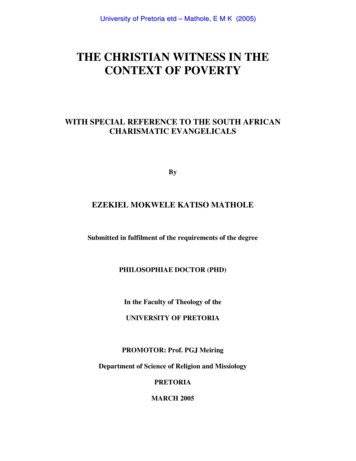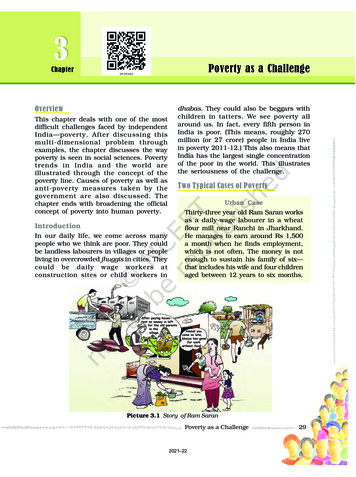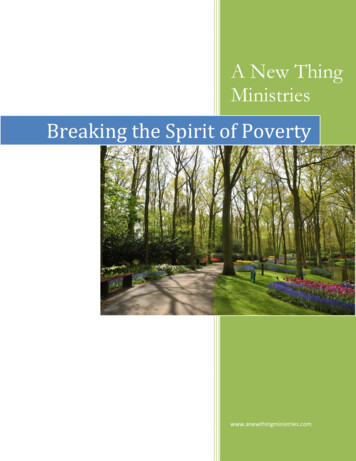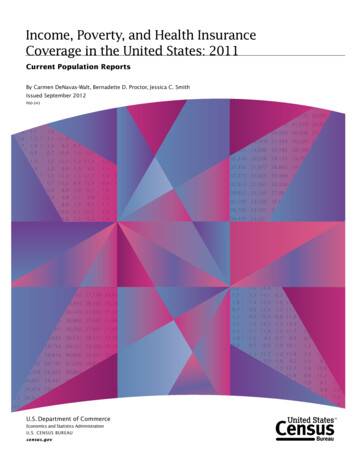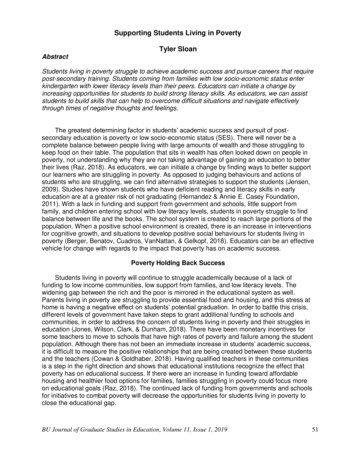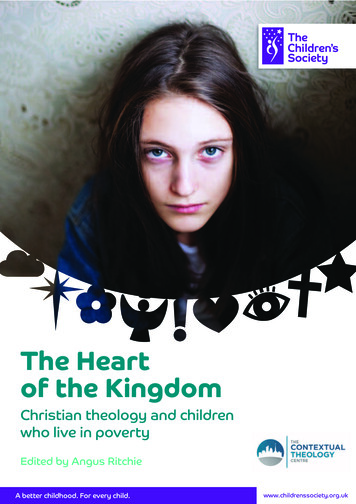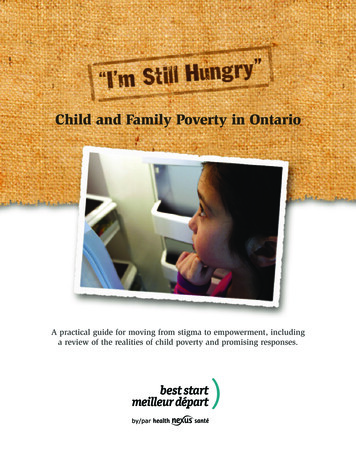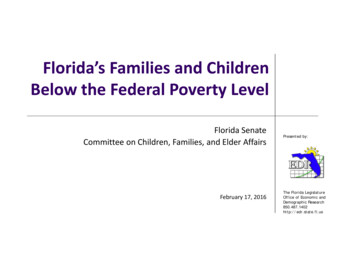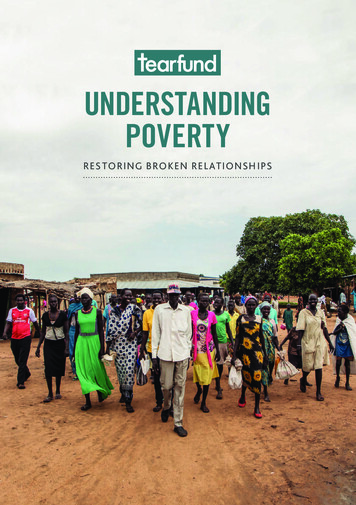
Transcription
UNDERSTANDINGPOVERTYRES TORING BROKEN RELATIONSH IPS
‘I HAVE COME THAT THEYMAY HAVE LIFE, AND HAVEIT TO THE FULL.’JOHN 10:10ACKNOWLEDGEMENTSThis booklet has been written by Anna Ling andHannah Swithinbank with the help of Seren Boyd, anddesigned by Paul Sturrock. It draws on conversations,research reports and organisational experience fromthe past 20 years.We extend our thanks to the many Tearfund staffand partners, past and present, who gave theirtime to input and commented on drafts. Theirthoughtful reflections have helped us draw outkey ideas, perspectives and suggested actions. Ourparticular thanks go to Helen Gaw, Clara Vernon,the participants of the Global Forum on Church andPoverty in 2018 and to Catriona Dejean, Tearfund’sDirector of Strategy and Impact and Ruth Valerio,Director of Advocacy and Influencing, whoseoversight was invaluable.
CONTENTSIntroduction4What is poverty?6What change do we want to see?8How will change come?12Tearfund’s role16How you can partner with us totackle poverty19Endnotes22Tearfund is a Christian relief and developmentagency working with partners and local churches to bringwhole-life transformation to the poorest communities. Tearfund 2019. All rights reserved.Cover image: Women with food vouchers walk to themarket to receive their food items from local vendors.South Sudan.Cover photo: Will Swanson/TearfundPhotos from top: Clive Mear, Geoff Crawford,Jenny Barthow/Tearfund
4 . UNDERSTANDING POVERTYINTRODUCTIONJumana delves deep into the parched earth to steal seeds from ants’ nests.She has to dig a metre down to find the scant harvest that rattles in thebottom of her bowl. This will be the only food her family has today.Jumana and her children live in Hillé Bar,a tiny village in Chad, on the edge of theSahara. The hamlet is ringed by the stumpsof failed crops that the drought has claimed.The river where they collect water has driedup and Jumana and the other women haveto excavate the sandy banks to find deeperreserves. The land has turned to dust.Jumana’s husband left to find work in a ropefactory some distance away and his visitshome are rare. The women in the villageweave mats and bread baskets to sell at themarket, but they earn very little.The children don’t go to school – andnever have. Sometimes they’re so weakwith hunger, they can’t play or even stand.Already, one of Jumana’s children hasstarved to death.When we look at the world, poverty canfeel both deeply shocking and profoundlynormal. We hear the statistics regularly:ten per cent of the global population liveon less than 1.90 a day,1 while even in theUK, a so-called ‘developed’ or ‘first-world’country, 8.9 million people (14 per cent ofthe population) are described as living inAbove: Jumana from Hillé Bar village near Dabkere, ChadPhoto: Peter Caton/Tearfund
UNDERSTANDING POVERTY . 5households with ‘absolute low income’. 2Most of us are used to a regular onslaughtof images and stories in the media aboutpoverty and disaster, and to frequentrequests for help. If Tearfund supporters’response to such stories and appeals isanything to go by, the shock of beingconfronted with poverty does not seemto fade. As human beings, we instinctivelyunderstand that this is not how the worldshould be: people are not meant to livein poverty.People’s desire to respond to this sufferingdoes not seem to fade either. They canbe incredibly generous, ready to give ofthemselves – their time, skills and money –to help make the world a better place.A key question for an organisation such asTearfund, for our supporters and for thosewith whom we work is: How can we bestrespond? What are the steps and activitiesthat will help end extreme poverty, andhow do we, individually and corporately,play our part?To answer this question, we need tolook more closely at poverty. We needto understand what poverty is and howit affects people, to think about its rootcauses and the different factors andsystems that can enable and exacerbateit. We also need to have a vision of what aworld without poverty would look like so10%of the global populationlive on less than 1.90a day1that we have an end goal for our relief anddevelopment work and we know what wewant to see as a result. This means askingdeep questions about what it means to behuman, how we are supposed to live in theworld and what it means to flourish.This booklet presents Tearfund’s thinkingabout what poverty is and how we can bestrespond. It draws on years of experienceand reflection and on conversations aboutthese very questions with many differentpeople: from those we are working withand serving in some of the world’s poorestcommunities, to development experts,church leaders and theologians, topoliticians, academics and business leaders.It describes our understanding of the natureand causes of poverty, and our vision fora future in which the whole of creationthrives. Subsequently, we explain how thisvision can be pursued, with a particularfocus on the part that we believe Tearfundis called and equipped to play. Finally,we conclude with some suggestions forhow you can join Tearfund in this work, asindividuals and with your churches, focusingon prayer, giving and action.Left: Violette in Burundi attends a nutritionproject run by the Anglican Diocese of MatanaPhoto: Tom Price/Tearfund
6 . UNDERSTANDING POVERTYWHAT IS POVERTY?How we understand poverty will determine our response to it. Many,especially in the West, understand poverty as economic poverty. Forexample, the World Bank defines people in poverty as those living onless than 1.90 a day.Other measures of poverty such asthe Multidimensional Poverty Index(MPI) and The Happiness Index lookbeyond economic poverty, recognisingthat poverty is more complex and alsorelates to health, education and access toresources. Tearfund’s understanding ofpoverty goes much further than eventhese definitions or metrics.A BIBLICAL PERSPECTIVEON POVERTYGod’s inherent nature is good. One of theways this is shown in the Bible is throughthe central theme of justice and care for thepoor in scripture. Consequently, povertyand oppression are symptoms of somethingfundamentally wrong in the relationshipbetween God and humanity.The biblical narrative describes an arc ofhistory starting from a life of wholeness increation (Genesis 1 and 2) that was marredby the Fall (Genesis 3). The consequencewas broken relationships – ultimatelywith God, but also with each other, withourselves and with the whole of creation.This is shown in the following verses:BROKEN RELATIONSHIPWITH GODAfter sinning, Adam and Eve hid fromGod. ‘Then the man and his wife heardthe sound of the LORD God as he waswalking in the garden in the cool ofthe day, and they hid from the LORDGod among the trees of the garden.’(Genesis 3:8)3 The consequence oftheir disobedience was that theirrelationship with God changed andthey were expelled from the garden.BROKEN RELATIONSHIPWITH SELFGod created men and women in hisown image (Genesis 1:26). However,after the Fall, shame entered Adamand Eve. ‘Then the eyes of both ofthem were opened, and they realisedthat they were naked; so theysewed fig leaves together and madecoverings for themselves.’ (Genesis3:7) Consequently, they no longerunderstood or felt comfortable withthemselves as God’s image-bearers andchildren. This took away their identity,which takes away their very humanity.Poverty takes away human identity inGod and changes the perspective wehave of ourselves.
UNDERSTANDING POVERTY . 7BROKEN RELATIONSHIPSWITH OTHERSThe relationship between Adam andEve was broken. ‘ “Your desire will befor your husband, and he will rule overyou.” ’ (Genesis 3:16) The genuine,natural harmony they enjoyed withone another was ruined and injusticeentered the world.BROKEN RELATIONSHIPWITH THE ENVIRONMENTThe relationship between humans andthe environment was broken. ‘ “Cursedis the ground because of you; throughpainful toil you will eat food from it allthe days of your life.” ’ (Genesis 3:17)Consequently, there is no longer anease in nature’s bounty or fruitfulness.Since the Fall, men and women havehad to toil, with no guarantee of anequal return on their effort in workingthe land.So, the Fall, documented in Genesis 3,has resulted in the imperfect world wenow experience. Poverty and injustice areexpressions of our separation from God,which impacts the environment as wellas humanity.Poverty is the result of a social andstructural legacy of broken relationshipswith God, a distorted understanding ofself, unjust relationships between people,and exploitative relationships with theenvironment. These broken relationshipsnot only affect individuals’ lives, decisionsand actions, but also create brokensystems, leading to problems such as powerimbalances and corrupt governments. Thesefractures are made worse by conflicts andnatural disasters, many of which also haveroots in the broken relationships betweenGod, humanity and wider creation.In our broken world, unjust systems andpower structures make it easy for us tobecome complicit in sin and in exacerbatingpoverty, even unwittingly. Our decisionsand choices can so easily condone, evenshore up these systems. Theologian JustinThacker describes this systemic aspect ofpoverty using a vivid metaphor: ‘As thestrings in one part of a net are strengthenedor broken, so the tension in other parts ofthe net is changed Collective purchasingdecisions in London can impact whether achild in Bangladesh gets to go to school.’4The consequence of the Fall is illustrated inFigure 1 (below).FIGURE 1 – Broken relationships as a result of the FallTHE PROBLEMWITH WHOMLEADING TO WHAT AND isastersSpiritual,social andmaterialpovertyWider creationGLOBAL
8 . UNDERSTANDING POVERTYWHAT CHANGE DO WE WANT TO SEE?THE CHANGE WE WANT TO SEE ATTHE LOCAL LEVELThe Bible tells us that God is working to redeem and restore his whole creation. InJohn 10:10 Jesus says: ‘I have come that they may have life, and have it to the full.’This life of ‘wholeness’ encompasses all aspects of life: ‘being’, ‘having’, ‘doing’and ‘interacting’. It is inherently relational. Whereas discussions of well-beingare often linked to maximising one’s own potential, the biblical notion of shalom(‘peace’) is about the well-being of the whole community, and the individualwithin it. Shalom cannot exist where there is no justice and righteousness.We acknowledge Jesus’ words in Mark14:7 that ‘the poor you will always havewith you’. Jesus is quoting here fromDeuteronomy 15:11; yet, in Deuteronomy15:4–5, Moses says that if the people fullyobey the Lord and his commands, thenthere need be no poor among us. In otherwords, poverty itself is an indication ofsin, of not following God and obeying hiscommands. While our salvation is assured inChrist, we live in an imperfect world and weare still imperfect. Therefore, poverty willnot be fully eradicated until Christ returns,as Das (2016) writes:‘While change is possible complete, lastingand sustainable social transformation onthis side of eternity will never be a reality,because we live in the in-between timeswhere evil and the kingdom of God coexist inthis world.’ 5Right: Celebrating the success of women’sgroups in South SudanPhoto: Tom Price/TearfundTherefore, we believe that Christiansare called to be part of restoring brokenrelationships while we wait for that work tobe completed when Christ returns.Tearfund’s approach to overcomingpoverty is holistic: we aim to restore allfour different types of broken relationship.This approach goes beyond meeting basicneeds to enabling and empowering peopleto flourish.
UNDERSTANDING POVERTY . 9RESTORED RELATIONSHIPWITH GODRESTORED RELATIONSHIPSWITH OTHERSHuman flourishing depends on aliving relationship with God theFather through Jesus in the powerof the Holy Spirit (Ephesians 2, John15). Shalom is about being right withGod through repentance and theforgiveness of our sins. It is a gift,and not a human achievement, and itis dependent on God’s grace. God’sdesire is that individuals respondto Christ’s invitation of a restoredrelationship with him, and love Godwith all their hearts, all their souls,all their minds and all their strength(Luke 10:27). This response enablespersonal transformation, through theSpirit, which is reflected in a person’scharacter, values and behaviour.Restored relationships arecharacterised by love and respect,and by being able to work outdifferences with others, especiallythose people with whom we do nothave an immediate affinity. Thesedifferences may include gender, race,culture, status or religion. Beforerestoration, these relationships maybe characterised by misunderstandingor ignorance, leading to conflict,abuse or violence. Being willing tolisten and understand differences andresolve tensions through repentance,forgiveness and reconciliation is vitalfor restoring these relationships.This also applies to our relationshipswith local government, nationaland international authorities andinstitutions, and with businesses.God’s desire is for individuals andcommunities to seek unity in adiverse world, and love others despiteour differences.RESTORED RELATIONSHIPWITH SELFThis requires us to be aware of ouridentity in the eyes of God (Genesis1:27, 1 Thessalonians 1:4) and to bringour body, mind, soul, feelings and willback into line with that identity. Italso involves having the opportunityand security to use our gifts to theglory of God (1 Corinthians 12:12–30).God’s desire is that individuals wouldunderstand they bear his image andshow him to the world in all areas oftheir life.RESTORED RELATIONSHIPWITH THE ENVIRONMENTLiving sustainably means caringfor the whole of creation (Genesis1:26, 2:15), including the physicalenvironment and living creatures, andmaintaining environmental resourcessuch as ecosystems and biodiversity.Furthermore, it includes how wemanage resources such as water, land,seeds and the air (including limitingemissions of harmful gases that lead toclimate change), which in turn impactsthe poorest and most vulnerablepeople. We recognise that as humanbeings we have failed to do this welland God’s desire is for individuals togo back to his instruction to work theland and take care of it (Genesis 2:15)and honour the fact that all creation isGod’s (Psalm 24:1).
10 . UNDERSTANDING POVERTYHOLISTIC TRANSFORMATIONWe want to see whole-life transformation for individuals,communities and society at large.6 This is how we envisage thischange:People demonstrate a commitment to building and sustainingloving, equitable and affirming relationships and can manageconflict constructively.Cross-community dialogue and community action for the commongood are the norm. Differences are valued and respected andeveryone is included in community activities.Christians from different denominations work together as saltand light to achieve positive change in their own communitiesand beyond. They work with other Christians and faith groups toinfluence and impact society at the local and national levels.People are supportive of one another and are at peace with thepast, with hope for the future. They are able to share concerns andhave the emotional resilience to withstand and adapt to shocks,stresses and uncertainty.Indicators for physical health are continually improving for allgroups, particularly the most vulnerable, and everyone has equalaccess to resources to keep them healthy.People can access and use the material resources they need tosustain their livelihoods in an environmentally responsible way.They collaborate with others, both to understand how naturalsystems operate and to ensure sustainable use of resources, forthe common good.Ultimately, everyone can thrive within a flourishing naturalenvironment, both as individuals and as a community.Individuals and groups recognise and realise their own potential,and also help realise the potential of others, sharing theirexpertise. People plan creatively, learn, and adapt in response tochanging needs and contexts to bring change collaboratively andachieve a shared vision.The views of all groups are represented and considered so thattheir views influence decision-making about their future.
UNDERSTANDING POVERTY . 11THE CHANGE WE WANT TO SEE ATA GLOBAL LEVELEvery individual and each community lives and operates within systems:economic, political, legal and social. As we have seen, these systems arealso affected by broken relationships. We believe that for global systemsto be restored, they need to work according to these three key principles:First, we live within environmental limits. This means ensuring thatour economy works with, rather than against, the creation that Godhas given us. In keeping with Psalm 24, we believe that the abundanceof the earth belongs to all of us, and ultimately to God. That comeswith responsibilities, both to exercise care in how we use it, and also toshare the proceeds of that natural wealth fairly. In Leviticus 25, we seehow the jubilee reset land ownership to prevent wealth inequality frombuilding up over generations.7Second, everyone is able to meet their basic needs. This meansproviding an enabling environment and basic level of economic securityand protection for every person on the planet. This is the foundation forhuman flourishing and all people being able to realise their potential.Third, inequality is kept within reasonable limits. This encompassesboth income inequality and wealth inequality, at national andinternational levels. 8A pastor tends to his potato cropin El Tambo, PeruPhoto: Geoff Crawford/Tearfund
12 . UNDERSTANDING POVERTYHOW WILL CHANGE COME?WHO WILL HELP US CONTRIBUTETO THE CHANGE?We believe that individuals, the church, businesses, governments and widercivil society all have important roles to play in bringing about change.INDIVIDUALSAll communities and systems are madeup of individuals and are shaped by them(just as individuals are shaped by systemsand their communities). We have alreadydiscussed the way individuals can be changedby a restored relationship with God. Thistransformation, expressed through values,behaviours and actions, has a knock-oneffect for communities and systems.THE CHURCHWe believe that there is a special role forthe church within civil society at both localand global levels.In the opening chapters of the book of Acts,Luke tells the story of the disciples afterthey have received the Great Commission.At this time the group of disciples take ona new corporate identity; ‘the fellowshipof believers’ (Acts 2) becomes the church,the body of Christ on earth, continuing hismission until he comes again. As Moltmann(1977) puts it, ‘It is not the church that “has”a mission, but the reverse; Christ’s missioncreates itself a church.’9 Therefore the churchis commissioned to join in with God’s mission.Our key foundation is ‘integral mission’,which understands that God is working torestore broken relationships by respondingholistically to people’s needs, includingeconomic, emotional, spiritual and physicalones. The church, as the body of Christ,therefore has a vital and distinctive role toplay in fulfilling this mission.Above: A church in the remote Bolivian village of Tipa TipaPhoto: Zoe Murton/Tearfund
UNDERSTANDING POVERTY . 13Local churches can make three distinctive contributions to international development.THE CHURCH IS INTEGRALThe physical location of the church at theheart of local communities provides:AccessWhen international organisations havelimited or no access to an area, localfaith leaders hold the privileged positionof being able to reach where otherscannot go.Churches and church leaders can engagelocal people in discussions about theirown needs and ensure that the mostvulnerable are included.ImmediacyWhen a disaster strikes, response timescan make all the difference in savingpeople’s lives, and churches are oftensome of the first responders in a crisis.SustainabilityThe long-term presence and lowerturnover rate for church workerscompared with NGO staff meanschurches hold relationships andcredibility among the communities theyare embedded in, because their staff arepart of the community.THE CHURCH IS INSPIRATIONALThe Christian identity of the church actsas an asset in providing:A whole-person approachThis means addressing the emotionaland spiritual needs of those livingin poverty or caught up in disasters,alongside their immediate physicalproblems – an approach we call ‘integralmission’ (see p12). The worldview ofChristians means that they understandtheir lives and problems in terms of theirfaith, and can more easily engage withpoverty holistically.The church has a biblical mandate tohelp those in need.Christians see looking after thevulnerable as an outworking of theirfaith, so are often inspired to offerhelp, frequently without paymentor recognition. This means thatthe church supplies services andsocial infrastructure in much of thedeveloping world.InfluenceHarnessing the influence of churchleaders and the church more generallycan be a huge advantage in humanitarianand development responses. Because thechurch is deeply embedded in society,with roots into community history,it holds the trust and respect of thepeople. This allows church leaders tochallenge traditions, beliefs and valuesthat may perpetuate poverty.THE CHURCH IS INFLUENTIALThe church is one of the largest civilsociety networks in the world, and oneof the few movements that is both localand global in its reach and influence.This offers enormous potential to shapeattitudes and speak up on behalf of thepoor and the oppressed, and huge scopefor successful initiatives to be replicatedacross its network.All this makes the church a highly distinctiveand effective partner in tackling poverty, andbrings huge added value to humanitarian,development and advocacy responses.10We acknowledge that the church cansometimes have a negative impact onefforts to end poverty. However, webelieve that when the church is living outits biblical mandate, it has a vital role toplay in ending poverty.
14 . UNDERSTANDING POVERTYGOVERNMENTS, BUSINESS ANDCIVIL SOCIETYGovernments, business and wider civilsociety all play important roles in bringingpositive change at both local and globallevels, when they are focused on thecommon good. The church must work inpartnership with them.GovernmentsGovernments help bring abouttransformation by, for example, ensuringorder and stability, delivering and protectingpublic goods, and providing education andaccess to basic services. Governmentsalso play a vital role through policies toincentivise positive practices.BusinessBusiness helps bring about transformationby, for example, providing the economicengine that generates the resourcesto lift whole countries out of poverty;creating (through research and technicalinnovation), producing (throughmanufacturing) and distributing (throughsales and marketing) the products andservices people need to live full lives.Business provides opportunities foremployment through which peopledevelop and exercise their creativityand gifts, thus contributing to theircommunities. People gain fulfilment andempowerment through work, as well aswages which are essential for lifting themout of material poverty. And, significanttax revenues are provided for governmentsand foreign exchange through trade.Right: A civil-society marchfor climate justicePhoto: Clive Mear/TearfundCivil societyCivil society helps bring transformationthrough:providing a voice for communitieshelping to resolve conflict at alocal levelproviding relief and services to thevulnerable, particularly in fragile statesdelivering humanitarian relief during andafter a disaster or warpeople making lifestyle changesto live more sustainably and usefewer resourcesinnovating new approaches to aid anddevelopment practice which can bescaled upadvocating for changes in policy toenable transformationholding governments to accountblowing the whistle on badbusiness practice
UNDERSTANDING POVERTY . 15GLOBAL INFLUENCESAt a global level, we believe that the three main influenceson change are:11WHAT THE ECONOMY INCENTIVISESPRICES, TAXES, SPENDING, INVESTMENTThe economic system determines what we can buy, whatwe can earn and what we can produce. New productsemerging from the economic system (such as mobilephones) can transform the way we live. Similarly,differences in price often determine what we buy: ifrenewable energy was cheaper than coal, we wouldprobably all be using it already. Likewise, differences in(risk-adjusted) returns often determine which ideas attractfinancial investment and which don’t.WHAT THE LAW ALLOWSLEGISLATION AND ITS ENFORCEMENTThe legal system sets out the formal rules of the game,through legislation, regulation and judicial precedent –covering everything from how contracts are drawn up andenforced, to what we can be arrested for and what thepunishment will be. This too is a hugely important lever foraffecting the behaviour of people and companies.WHAT SOCIETY EXPECTSTHE SOCIAL NORMS THAT GOVERN MUCH OF OUR BEHAVIOURThe socio-cultural system frames what society expects ofus, what’s considered ‘normal’ and – conversely – what’sconsidered unacceptable or shameful.
16 . UNDERSTANDING POVERTYTEARFUND’S ROLEOUR SPECIFIC CONTRIBUTIONTearfund’s calling is to follow Jesus where the need is greatest, and ourexpertise is in international development, humanitarian aid and advocacy.We also see part of our role as enabling the church to live out its calling tohelp release people from poverty, regardless of their faith or background.So we put the church at the centre of all we do, working through localchurches wherever possible.Corrugated metal sheetsfor emergencyaccommodation, NepalPhoto: Anna Chilvers/Tearfund
UNDERSTANDING POVERTY . 17WE HAVE A BIG VISIONTHE WAY WE WORK‘To see people freed from poverty,living transformed lives and reachingtheir God-given potential’Wherever possible, we work with the localchurch. This is our major distinctive. Wherewe cannot, we aim to work through otherChristian partners and individuals.In order to achieve this vision we wantto see:Churches mobilised: The church isenvisioned, empowered and equipped toplay its part in transforming the poorestcommunities and changing society.Communities transformed: The poorestcommunities are resilient to shocks andstresses, working for peace and unity,and contributing to better futures forthemselves and others.Emergency needs met: Immediate needsare met when crises and natural disastershit and community structures andmechanisms are affected.Society changed: Social, political,economic and environmental systems andpolicies work for the poorest communities,ensuring access to basic needs, reducedinequality and sustainable growth.OUR VALUESChrist-centredCompassionateServant-hearte dTruthfulCourageousIn pursuit of our desired outcomes, ourthree main approaches are:Community developmentHumanitarian responseInfluencing and advocacyIn community development, we supportcommunities to lift themselves out ofpoverty. We aim to build local capacity,so that communities become resilientand can continue to combat povertyand injustice with their own resourcesand relationships. We are committed tosupporting communities in understandingand addressing risks of all types.In humanitarian response, we respondimmediately targeting those in greatestneed. We are committed to impartiality,providing assistance to the most vulnerablewithout regard for: age, disability, sex,sexual orientation, gender reassignment,marital or civil partner status, pregnancyor maternity, race, colour, nationality,ethnic or national origin, religion or belief.We respond to rapid-onset disastersand protracted crises, to man-made andnatural disasters. We promote partnerand community planning to help themrespond to and recover from future shocksand stresses, ensuring that even the mostmarginalised can participate.In influencing and advocacy, we influencethe global church and governments withand on behalf of the poorest people, to bringabout large-scale change. We believe thatchange must happen at multiple levels forthere to be meaningful transformation. Wetherefore work to shift public perception onkey issues, influence strategic leaders anddecision-makers, and mobilise the churchand civil society to be agents of change atlocal, national and global levels.
18 . UNDERSTANDING POVERTYFigure 2, below, illustrates how our approaches help fulfil our vision and achieve thechange we want to see.While our approaches and outcomes remain largely the same, the priorities andgeographical areas we work in may change and develop over time. This allows us torespond and leverage our expertise, skills and resources in the most effective ways.FIGURE 2 – Our theory of change: a simplified pathway mapOurunderstandingof alisedstrategicobjectivesThe impactwe wantto seeThe visionwe want tosee fulfilledOUR BrokenrelationshipsCommunitydevelopmentAdvocacy RegionalSocietychangedGlobalTo see peoplefreed frompoverty, livingtransformedlives andreaching theirGod-givenpotentialEmergencyneeds metAssumptionsUnderlying our understandingof how change happens is aset of assumptions. These arethe factors that will influencepositively and negatively ourability to bring about the changewe desire. We continue to testthese assumptions by buildingour evidence base and byadapting and learning. Change is influenced by ourbelief in the truth of Christianityand the existence of God. Broken relationships can berestored and therefore lead toindividuals and communitiesbecoming more resilient. Building relationships is along-term process. This hassignificant implications forthe change we desire to seeand how we measure it. It alsohas implications for what weshould focus on,
structural legacy of broken relationships with God, a distorted understanding of self, unjust relationships between people, and exploitative relationships with the environment. These broken relationships not only affect individuals' lives, decisions and actions, but also create broken systems, leading to problems such as power
